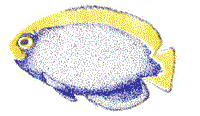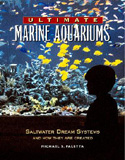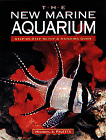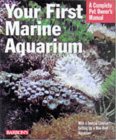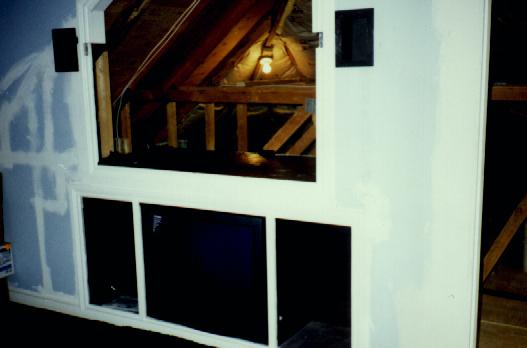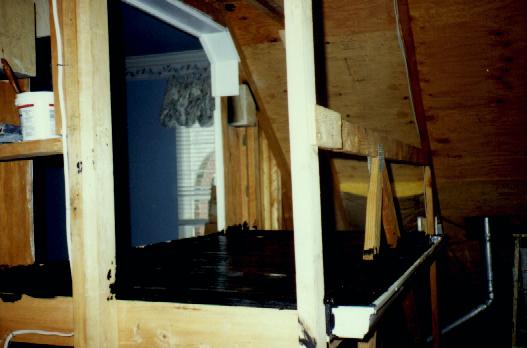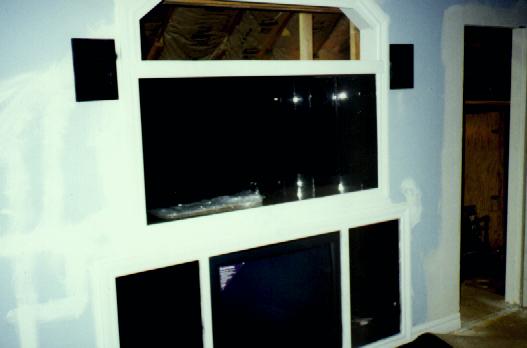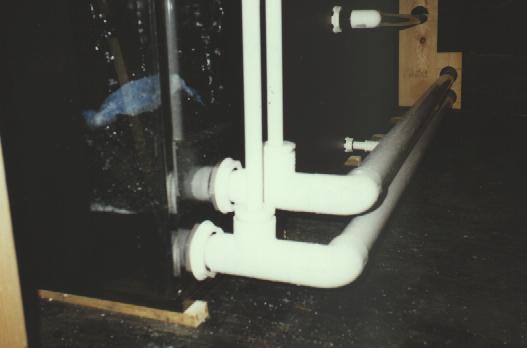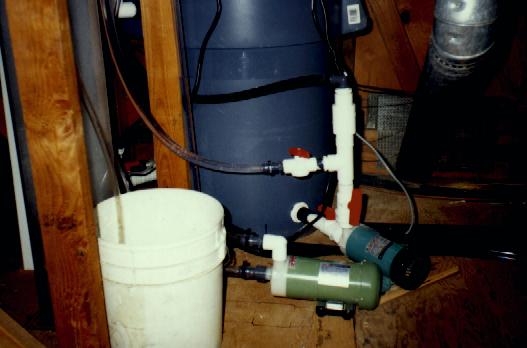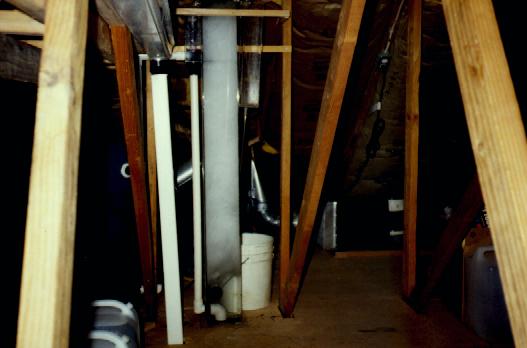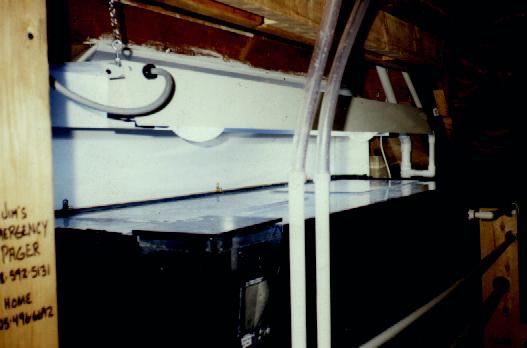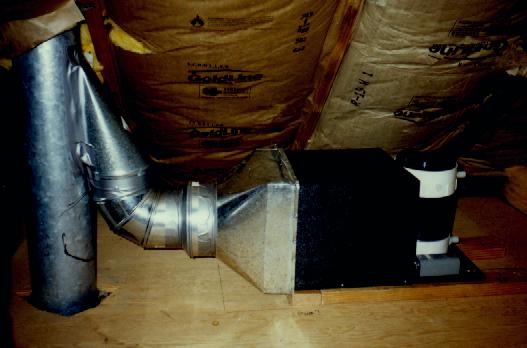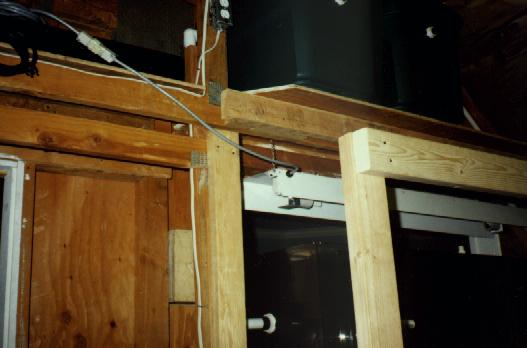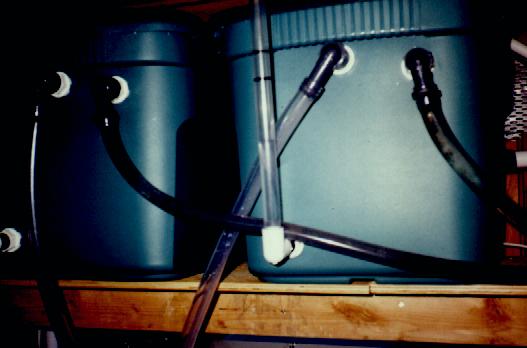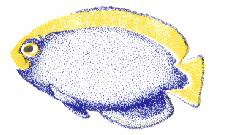How My 150 Gallon Marine Reef Tank Was Built
Browse the Categories to the right, or enter a topic here
on this subject ?
The Conscientious
Marine Aquarist
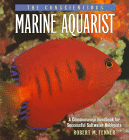
|
|
|
I have had a 50 gallon "fish only" for a couple of years now, and have really enjoyed all the colorful Saltwater Fish in it. Recently my wife and I decided to utilize a spare room upstairs, that had been doing nothing more than storing all those extra things you never use, and convert it into an Day Room / Entertainment room. I have seen the Reef Tanks at my local Fish Shop and have always been fasinated by the variety of shapes and colors of living corals, so we decided to have one built. My father-in-law had a friend, Gene, who had done carpentry work for the family before, and Jim from Tidal Wave began constructing and designing a 150 gallon Surge Reef Tank.
Gene started first by cutting out the wall where the face of the tank, television and stereo system would be. Behind the wall he built a sturdy platform to support the tank, as well as, protect the audio / visual equipment below it.
Now was Jim's turn. He placed the 60" long, 30" high, 24" wide Acrylic tank onto the platform and began to assemble the plumbing. Inside the tank was glued a 2" strip, placed on its end, running the length, of the middle of the tank. This would serve as a wall to keep the Live sand at the front of the tank. Behind the backside of the strip was an elevated Egg Crate grid, this would support the Live Rock. Entering the back of the tank, and below the grid, would be the Filter return which would blow the debri's out from under the elevated Live Rock. Because Jim was going to add Surge Makers this meant that the water level would fluctuate within the tank, for this he had the Internal Overflow cut 1" shorter than the inside height of the tank. This would prevent the water from flowing out of the top of the tank. On the rear of the tank we placed two 1 1/2" drain pipes to easily carry the water from the overflow out to the resevior. Each pipe had its own breather vent to prevent a siphon from occuring, as well as, avoiding the slurping noise associated with heavy and varied volumes of water movement.
The water from the overflow traveled horizontally to the other end of the platform where it then dropped into a 32 gallon resevior ( heavy duty trash container ). The resevior was simply that, a resevior, no Bio-Balls, no Live Rock. A single Iwaki 40 RLT drew from it and returned its water back to the tank via the Spraybar that was placed under the Egg Crate grid. A portion of the water from the resevior was sent to a 4 ft. counter current Protien Skimmer which utilized second pump ( MAK 4 ) to drive the Venturi air system. A third pump, an Iwaiki 40 RLXT, was also used, which drew directly from the tank, passed water through the chiller and then returned to the tank. This pump was dedicated for Internal Circulation within the tank.
The lighting system consisted of a Hamilton Retro-Fit suspended above the tank, and contained two 250 watt 55K Metal Halides, and two 40 watt Actinic flourescent bulbs. Timers controlled the lights to provide a regular Photo-period. Temperature was maintained by a 1/4 H.P. Chiller ( West Coast Aquatics ), and since we were on the backside of the tank, and in the attic, we utilized the vent pipe from the water heater in the garage below to vent the units heat into.
Now came the real water movement portion of the tank, what Jim called the Carlson Surge Makers ( CSM ). Placed above the tank ( see left photo, upper portion ) were two 15 gallon containers. These units recieved there water from the resevior below, and independently and alternately discharged their water into opposite ends of the tank. Due to their placement, Jim placed site pipes ( verticle, clear PVC pipes ) that showed the water level within each Surge container. He also placed overflow pipes from each unit in case they filled up too full. It would take about two minutes for each unit to fill up, then after their siphon started it would take about a minute to siphon the water into the tank. It took a far amount of adjusting the plumbing involved with the Surge Makers, but once we got it right its run without a hitch since. I agree with Jim that the success with the corals, in particular the Seafans is definately due to the surge motion created in the tank. Now came the fun. Within the tank we placed 100 lbs.of Florida Live Sand, 80 lbs of Fiji Live Rock, and 90 lbs of branching Marshall Islands Live Rock. Over the last few months we have added six Frilly Seafans, Hammer, Flower Pot, Torch, Fox, Open and Closed Brain Corals. Additionally there are two Leather Corals, Green Star Polyps, and a Blue Sponge. The fish load consists of a Chocolate and Sailfin Tang, a pair of Bangghai Cardinals, an Eblii Pygmy Angel, Coral Hog Fish and a Diamondback Goby. These fish along with a Serpent Brittle Starfish, two Cleaner Shrimp, a few Turbo Snails, and a number of Blue Leg Hermits crabs keep the tank cleaned of large debri's, uneaten food, and parasites. I am very pleased with the design, installation, and operation of the tank and equipment. My wife and I thoroughly enjoy the tank, and find ourselves sitting in front of it constanly. What a wonderful hobby ! NOTE, Craig's reef tank appears in Mile Paletta's Ultimate Marine Aquariums book
Visit the Aquarium Design home page
|
Acrylic aquariums, Fish Tanks, Aquarium Stands
' Build Your Aquarium On-Line '
___________________________________________
Jellyfish,
Jellyfish
Tanks and Plankton Kreisel
___________________________________________
MACNA X

![]()

The Tenth Annual Marine Aquarium Conference Of North America
Presentation DVD's
September, 27, 28 and 29, 1998
Long Beach, California

